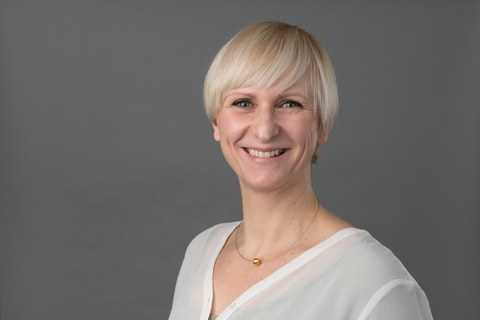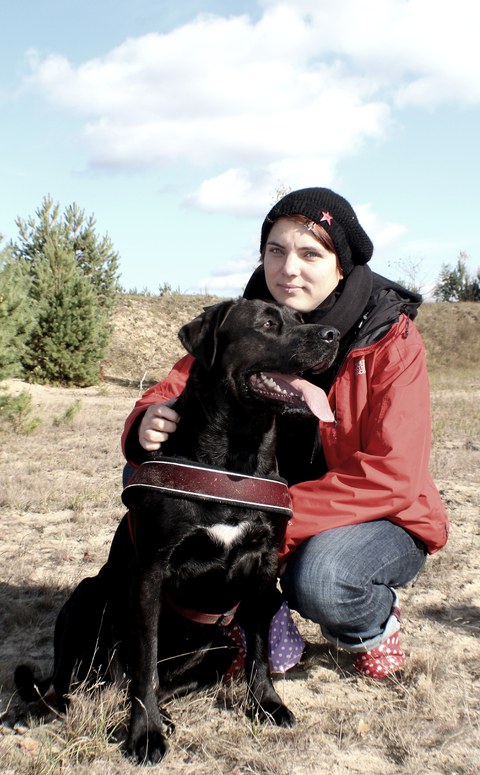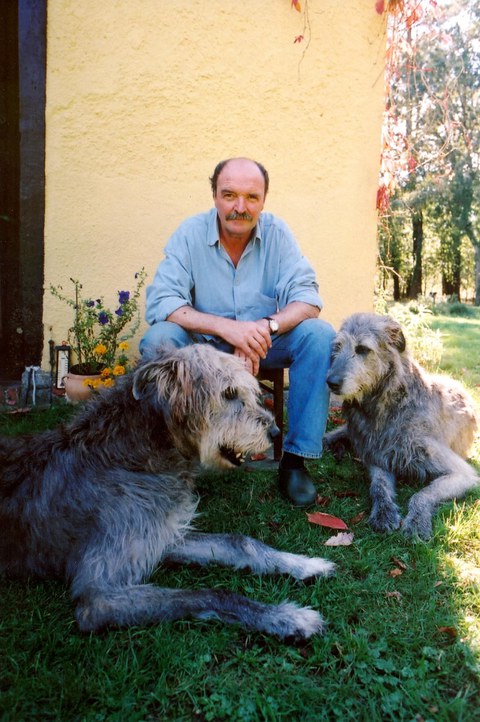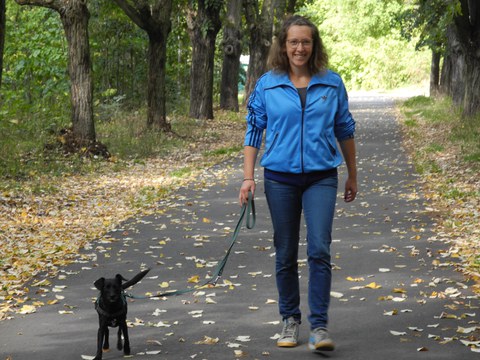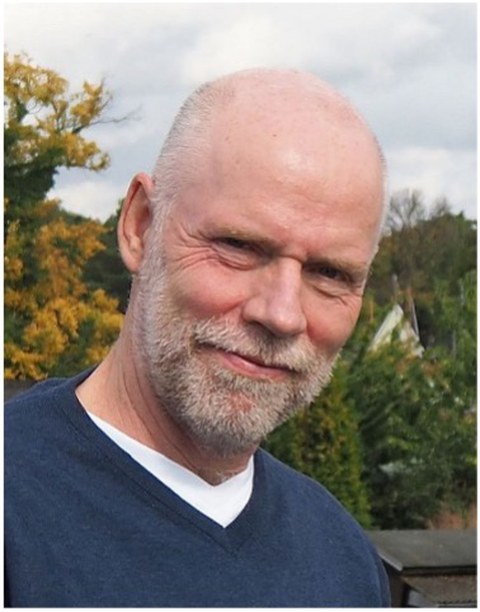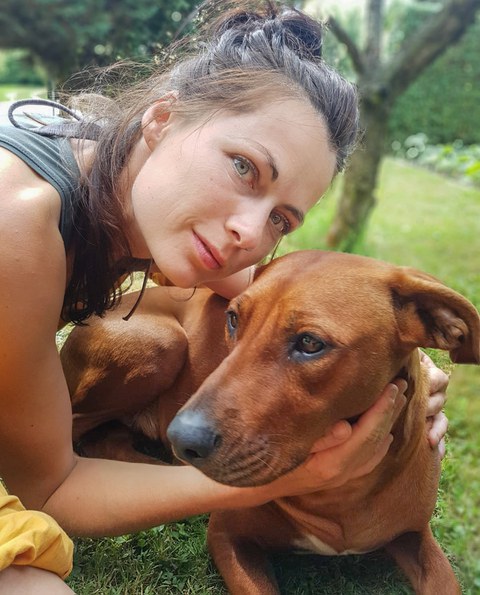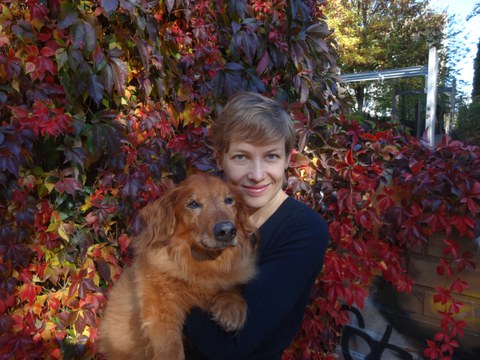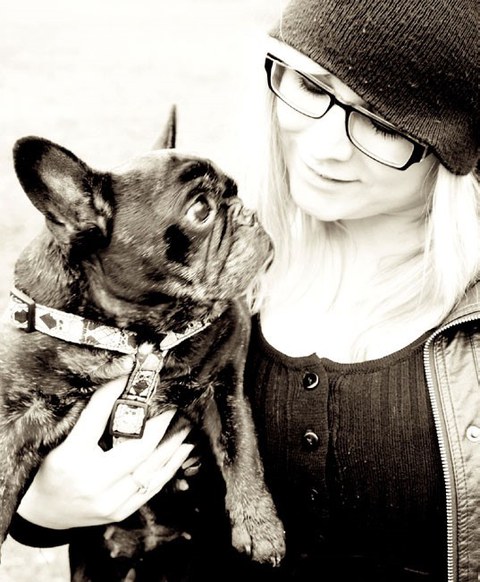Members of the research group
Antje Beckmann studied educational science, specializing in social pedagogy/social work at the TU Dresden, is a systemic therapist and has been a central member of the Human-Animal Relations research group since it was founded in 2004. In her many years as a Research Associate at the Institute for Social Work, Social Pedagogy and Welfare Sciences at TU Dresden, she has taught and conducted intensive research on human-animal relationships and animal-assisted interventions, among other things.
Together with Frank Nestmann, she managed the "Pets at the Johanniter-Stift Dohna-Heidenau" project and wrote her dissertation on the topic of "Human animal bond within the context of dementia. Possibilities of animal-assisted intervention for the psycho-social well-being and quality of life of elderly people and people with dementia in inpatient facilities" (2012). She was also significantly involved in the application, conception and implementation of the DFG research project "Animal-assisted intervention for dementia patients"(Completed projects). Antje Beckmann currently works as a student advisor at the Central Student Advisory Service of TU Dresden.
___________________________________________
Annett Eckloff studied for a Bachelor's degree in Social Work and a Master's degree in Practice Research in Social Work and Education at the Alice Salomon University of Applied Sciences Berlin and is a trained specialist in animal-assisted interventions (according to ISAAT standards). She has been employed at the ASH Center for Continuing Education since 2010 and was given the opportunity to start an additional training course for animal-assisted interventions (with a focus on dogs). This ISAAT-certified course has been offered annually since 2012. Annett Eckloff currently leads the course together with Christiane Friese and Sandra Wesenberg. The focus of the course is on animal welfare and animal protection and their implementation in animal-assisted interventions.
In addition, from 2019 to 2021 she worked on the research project "Animal-assisted interventions in therapeutic youth residential groups" at Alice Salomon University and the University of Applied Sciences for Business and Law and in 2023 she was a Research Associate in the follow-up project "TGI-MOOC - Teaching animal-assisted skills digitally"(Completed projects). She is also pursuing a doctoral project on the human-animal relationship in social work. Specifically, she is investigating how cooperative relationships between social workers and animal welfare professionals are shaped when clients are in difficult life situations.
___________________________________________
Julia Enxing studied Catholic theology and philosophy at the universities of Mainz, Münster and Frankfurt St. Georgen. She completed her doctorate in 2012 with a thesis on process theology in the philosophy of religion and her habilitation on the topic of "Guilt and Sin (in) the Church" in 2017. From April 2020 to March 2024, she held the Chair of Systematic Theology at the Institute of Catholic Theology at the Faculty of Arts, Humanities and Social Science at TU Dresden. Since April 2024, she has been Professor of Fundamental Theology at the Faculty of Catholic Theology at Ruhr University Bochum.
For some time now, her research has focused intensively on the question of the relationship between humans and animals from a theological perspective. In doing so, she works closely with other disciplines. The aim of her reflections is to develop a contribution to a contemporary theology, i.e. one that does justice to ecological and planetary catastrophes and is characterized by respect in the mutual coexistence of humans and animals in both practical and intellectual terms.
Further information: www.juliaenxing.de
___________________________________________
Polli Hornung is a curative education nurse (graduated in 2000) and has worked in various outpatient and inpatient settings with people with disabilities, learning difficulties and mental impairments. At the end of 2014, she successfully completed her training as a certified specialist consultant for animal-assisted intervention and the therapy companion dog team exam at the Institute Mensch-Hund-Beziehung Sachsen (according to ISAAT standards).
She currently works together with her dogs "Brezel" and "Fräulein Brause" on the acute/admission ward of the child and adolescent psychiatry department at the Carl-Gustav-Carus University Hospital in Dresden. Their animal-assisted work is continuously evaluated here and the results have already been presented at various specialist conferences and congresses (including the "Child & Nature - Animal-Assisted Interventions and Environmental Education" conference in 2023).
Polli Hornung, Brezel and Fräulein Brause also work together in other contexts, including in outpatient care for the elderly and in prisons (in the "Mopsfidel & Pudelwohl" program; Completed projects). Polli Hornung also works as a lecturer at the Center for Continuing Education at the Alice Salomon University of Applied Sciences in Berlin.
___________________________________________
Frank Nestmann was Professor of Counseling and Rehabilitation at the Institute of Social Work, Social Pedagogy and Welfare Sciences in the Faculty of Education at TU Dresden from 1993 to 2014, and was Dean, Director of the Institute and member of the Senate for many years. Since the late 1980s, he has been working on the health-promoting effects of the human-animal relationship. He has taught and conducted research on this topic at the universities of Bielefeld, Munich and Dresden (in addition to his main fields of work, counseling and social networks/social support). Among other things, he developed and published a 'BIO-PSYCHO-SOCIAL impact panorama of helpful animal effects', which is continuously updated with colleagues from the research group (latest version: Nestmann, Wesenberg, Beckmann 2016; publications) and has been presented at numerous conferences and congresses in Germany and abroad.
His Chair has conducted several (third-party funded) research projects on animal-assisted intervention(completed projects) and written numerous qualification theses (diploma, master's theses, dissertations).
He is currently cooperating with Sandra Wesenberg in German and international research projects, evaluation projects and further training courses on animal-assisted intervention(ongoing projects).
___________________________________________
Lena Scheidig holds a doctorate in literature from the University of Leipzig and has worked as a certified specialist in animal-assisted intervention with her therapy assistance dog Tarana since 2016. She has worked independently in a wide variety of settings and projects with different clients - mainly with children and young adults on the autism spectrum, with long-term prisoners and with senior citizens. She has certified further training as a systemic counselor and has been training as a dog trainer since summer 2023.
As a board member of the Federal Association of Animal Assisted Intervention, Lena Scheidig is involved in the further development and quality assurance of professional TGI as well as the protection and suitability of the animals used. She also works as a lecturer and publishes specialist literature in the animal-assisted field(publications).
Lena Scheidig is currently involved in the development of a training program for therapy assistance dog teams with a focus on children and adolescents, where she will train and educate human-dog teams.
Further information and contact: https: //www.lenascheidig.de/
___________________________________________
Michael Christian Schulze is a general practitioner specializing in geriatrics and addiction medicine, a health scientist and a specialist in animal-assisted intervention. He is also co-founder of the Institute for Intra- and Interspecies Communication (Iizak), board member of TierSucht e.V. and spokesperson for the research working group of the German Federal Association for Animal Assisted Intervention (BTI). In his current research projects, he is working on the importance of chum animals for opioid addicts in substitution therapy, body language and behavior of guinea pigs in animal-assisted settings (interdisciplinary research project with the Behavioral Biology Institute of the University of Münster and "Tiere helfen") and animal hoarding (interdisciplinary research project with the German Animal Welfare Association, the Federal Association of Civil Servant Veterinarians & TierSucht e.V., ongoing projects). In collaboration with Volker Meyer-Dabisch, he also produced the film "Not without my animals", a film about animal addiction helpers.
Further information: www.iizak.de, www.tiersucht.de.
___________________________________________
Mandy Weber holds a Master's degree in Clinical Psychology and Psychotherapy from TU Dresden (graduated in 2019). From 2014 to 2017, she worked as a student assistant at the Clinic and Polyclinic for Psychotherapy and Psychosomatics at Dresden University Hospital on various research projects (including data management, conducting various tests and diagnostic interviews). As part of her Master's thesis, she is now looking at the use of assistance dogs in Germany. To this end, she systematically analyzed the data from a comprehensive online survey of assistance dog owners(Completed projects).
Since successfully completing her studies, she has been working as a psychologist in psychosomatic medicine at the Median Clinic in Bad Gottleuba and has been training as a psychological psychotherapist with a specialization in depth psychology-based psychotherapy at the aap in Dresden since June 2019.
___________________________________________
Sandra Wesenberg studied 'Educational Science, specializing in Social Education/Social Work' (Diploma; TU Dresden) and 'Therapeutically oriented Social Work with Children and Adolescents' (Master's degree, HAW Mittweida) and worked as a Research Associate at the Institute of Social Pedagogy, Social Work and Welfare Science at the TU Dresden's Faculty of Education from 2008 to 2017. She has also been a member of the research group since 2008 and has worked on the DFG project "Animal-assisted intervention for dementia patients", among other things, and also wrote her dissertation in this context.
Since 2017, she has been a visiting professor of clinical psychology with a focus on counseling and therapy at the Alice Salomon University of Applied Sciences Berlin. In her teaching and research activities as well as her publications, she deals, among other things, with personal human-animal relationships and their relevance for social work as well as with animal-assisted interventions with so-called 'hard-to-reach clients', e.g. in psychiatry, prisons and inpatient youth welfare(completed projects). Together with Annett Eckloff, she has also been leading the ISAAT-accredited certificate course "Animal-assisted and animal-protected - animal-assisted therapy, pedagogy and support measures in social and health care" at ASH for several years and is a lecturer in various other training courses for prospective animal-assisted intervention specialists. She is currently researching animal hoarding (interdisciplinary research project with the German Animal Welfare Association, the Federal Association of Civil Servant Veterinarians & TierSucht e.V., ongoing projects).
___________________________________________
Lydia Wolff is a specialist therapist for systemic art therapy and a qualified educationalist currently working in residential youth care in Dresden. As a member of the research group, she worked intensively on the DFG project "Animal-assisted intervention for dementia patients" (2010-2012). Together with her dog Margie (French bulldog), she organized the sessions of the "Animal Tandems" program in the retirement homes and was also involved in the evaluation(Completed projects).
From 2012 to 2014, she worked on the project "Plan B - The path from youth detention to education" (funded as part of the federal program "XENOS - Integration and Diversity") and, among other things, implemented an animal-assisted program (with chickens) in the Dresden youth detention center. The conceptual structure and implementation as well as the evaluation of the animal-assisted project are described in an article in the volume "Soziale Arbeit im Jugendarrest" (2015, Publications).
